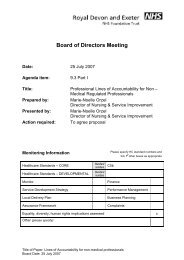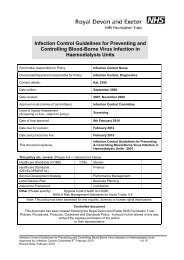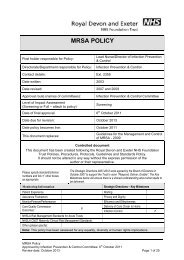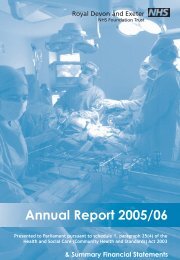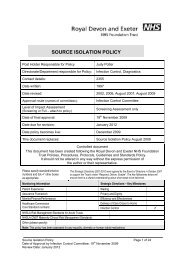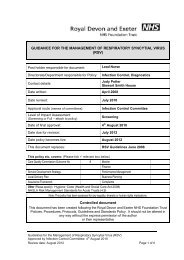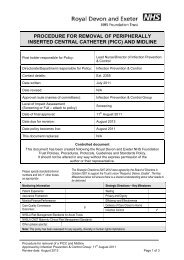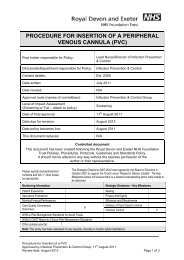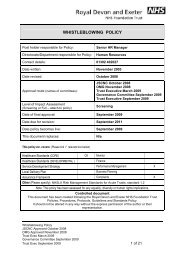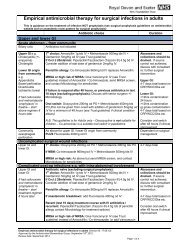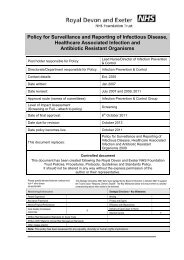Annual Report and Accounts 2012/13 - Royal Devon & Exeter Hospital
Annual Report and Accounts 2012/13 - Royal Devon & Exeter Hospital
Annual Report and Accounts 2012/13 - Royal Devon & Exeter Hospital
Create successful ePaper yourself
Turn your PDF publications into a flip-book with our unique Google optimized e-Paper software.
24 2. Progress on our<br />
<strong>2012</strong>/<strong>13</strong> Priorities<br />
<strong>Royal</strong> <strong>Devon</strong> <strong>and</strong> <strong>Exeter</strong> NHS Foundation Trust<br />
Quality <strong>Report</strong> <strong>2012</strong>/<strong>13</strong><br />
Zero tolerance<br />
approach to avoidable<br />
health-care associated<br />
infections<br />
In 2003, the Department of Health<br />
(DH) set out a clear direction for NHS<br />
organisations on actions to reduce<br />
hospital-associated infections (HAIs)<br />
<strong>and</strong> to curb the proliferation of<br />
antibiotic-resistant organisms (DH,<br />
2003). Each acute hospital trust has<br />
set targets to reduce hospital-acquired<br />
MRSA blood stream infections. The<br />
targets are being achieved through a<br />
range of prevention strategies such as:<br />
• Improved h<strong>and</strong> hygiene<br />
• Aseptic technique – a method<br />
used to protect wounds <strong>and</strong> other<br />
susceptible sites from organisms<br />
that could cause infection<br />
• Skin disinfection prior to insertion<br />
of drips<br />
• Prompt removal of drips <strong>and</strong><br />
catheters<br />
• Screening to identify people<br />
carrying MRSA<br />
• Topical treatments to reduce<br />
carriage of MRSA whilst in<br />
hospital.<br />
We also know from our Members that<br />
tackling hospital-acquired infections<br />
remains a priority for the public.<br />
Last year, as a result of these <strong>and</strong><br />
several other interventions, we<br />
reported a 98% reduction of MRSA<br />
blood stream infections acquired in the<br />
RD&E since 2004/5.<br />
This year (<strong>2012</strong>/<strong>13</strong>), we have achieved<br />
even more <strong>and</strong>, at the end of March<br />
20<strong>13</strong>, can report that there have been<br />
no hospital-acquired MRSA blood<br />
stream infections at the RD&E – with<br />
it being 550 days since the last MRSA<br />
blood stream infection was identified.<br />
We continue to apply the<br />
interventions that have made this<br />
reduction possible, <strong>and</strong> now pursue a<br />
zero tolerance approach to avoidable<br />
healthcare-associated infections.<br />
MRSA st<strong>and</strong>s for Meticillin resistant<br />
Staphylococcus Aureus (Staph.<br />
aureus). This is a common bacterium<br />
that can live, quite harmlessly, in the<br />
nose, throat <strong>and</strong> sometimes on the<br />
skin of about 30% of healthy people.<br />
However, Staph. aureus may cause<br />
harm (infection) when it has the<br />
opportunity to enter other parts of the<br />
body. This is more likely to happen in<br />
people who are already unwell <strong>and</strong><br />
in hospital, particularly those who<br />
have invasive devices such as drips<br />
<strong>and</strong> catheters. Whilst Staph. aureus<br />
can cause quite minor infections,<br />
it can also cause serious infections<br />
such as wound, chest or urinary tract<br />
infections. It can also enter the blood<br />
stream <strong>and</strong> cause septicaemia, which is<br />
a very serious infection.<br />
Staph.aureus infections are treated<br />
with a variety of different antibiotics<br />
depending on the type <strong>and</strong> severity<br />
of the infection. Unfortunately,<br />
some types of Staph. aureus have<br />
developed resistance to an antibiotic<br />
known as Meticillin <strong>and</strong> other similar<br />
antibiotics. Types of Staph. aureus<br />
that are resistant to Meticillin are<br />
known as MRSA. It is widely accepted<br />
that people who carry MRSA in their<br />
nose, throat <strong>and</strong> on their skin have<br />
a significant chance of developing<br />
a blood stream infection whilst in<br />
hospital.



